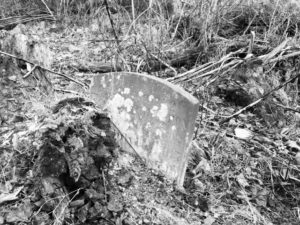Many of Boonsboro’s buildings and landmarks of the Civil War era have vanished with the relentless pressure of time, weather and human action. For example, the community that arose around the Roxbury distillery is gone, but for a few walls of the old hotel that are still standing; and Boonsboro’s jail house, the “Old Jug”, that stood on Potomac Street for 80 years exists only in our memory. The Western Maryland Room at the Washington County Free Library has a comprehensive collection of records of some 29 past and present African-American cemeteries in Washington County. Some of these graveyards have vanished, but these meticulously assembled records ensure they will not be forgotten.
The hill just east of Reeders Memorial Home is called Short Hill and this area was home to a small community of African-Americans through 1900 or so. In a copse of trees at the edge of a pasture, Short Hill Cemetery can be found, the final resting place of some of Boonsboro’s black residents during the Civil War. The area is about ½ acre and is bounded by rows of rocks, perhaps the remnants of a dry-stack stone wall. It is thought there are around 20 graves in Short Hill, but only two headstones are visible today. The graves of Elias Washington, born December 11, 1802 – died July 12, 1867, and Samuel Washington, the son of Elias and Ann R. Washington, born May 20, 1841 – died February 7, 1864, are memorialized with headstones. But in the 150 years since the placement of the markers, nature has taken it’s toll and the trees that once sheltered the grave sites have fallen, replaced by others. With the further passage of time, the forest will consume the headstones and this trace of Boonsboro’s past will be gone from our sight, only to live in our memories. Daffodils that conceivably beautified this plot of ground a century and a half ago still blossom each spring and help us remember what once was.
Photo of the remnants of the Washington headstones at Short Hill Cemetery by Chuck Schwalbe.



